A few Volunteering Stories During The Israel-Hamas War 2023
Background
Following Israel's Independence in 1948, Egypt maintains control of Gaza. There were continual terror attacks originating from Gaza resulting in the 1956 Sinai Campaign.
Israel conquers Gaza in 1967
In 2005, following the Israeli government's decision, all Jews were removed from Gaza. On the soft sand dunes of Gaza, Israeli settlers produced export quality lettuce, peppers, spices, flowers, etc. Over 4,000 Gaza's were employed. The Palestinian Authority makes no effort to continue agricultural production and perhaps export the products. Neither does any Arab country, nor does any wealthy Arab make any attempt to operate the hot-houses.
- Within six months Gazans destroy the remaining hot-houses.
- Immediately after entering Gush Katif, Gazans burn the synagogues.
- Hamas leader Khaled Meshal tells the disengagement is "the beginning of the end for Israel".
- A high number of Gazans are unemployed (40 - 60%).
The Hamas leadership in Gaza view this as a victory against the Zionists, as the first stage of removing the Jews from Palestine. They encourage violent acts from Gaza against Israel, employing rockets, suicide bombers, shootings, knifing, and hostage taking.
In 2006 local elections are held in Gaza between the Fatah and the Hamas, who gain the majority. In 2007 all Fatah senior officials in Gaza were taken to the highest building in Gaza, where the Hamas performed experiments on humans - to see if they could fly off the 6-story building. No, they can't, and hence the local population never protests in Gaza.
On October 6, 2023, there were NO Jews living in Gaza. About 20,000 Gazans were employed daily in Israel. Agricultural produce from Gaza was exported to Israel. Goods were transferred from Israel into Gaza.
On October 7, 2023, 3,500 Hamas invaded the Israeli settlements villages, and towns bordering with Gaza, brutally murdering over 1,400, including 260 at a Music Festival near Kibbutz Reim, taking 245 hostages into Gaza, with 10 more missing.
Today, as I write the numbers are 1,200 murdered, 361 soldiers and another 49 security personnel (police etc) killed, 245 hostages in Gaza (4 released, one freed by the IDF), and 10 missing. Since the beginning of the war, about 9,500 rockets have been launched towards Israel. About 12% of the total launches from Gaza towards Israel landed in the Gaza Strip and about 900 launches were carried out from civilian sites such as: mosques, schools, hospitals and cultural centers. Over 130 tunnel entrances have been discovered by IDF forces since ground forces entered Gaza.
I have been released from military service for 20 years. I did register with the local branch, but there is a new generation and I am not required.
My wife and I travel to Tel Aviv a few days a week to remain with our grandchildren, as the schools are partially closed and our children are working full-time. We do not want to leave the grandchildren alone at home, especially when the air-raid siren is sounded and we all go into the shelter.
My Volunteering
Local residents have prepared, cooked and baked food including fresh challah, to be distributed amongst army units stationed outside the border with Gaza in the South, and Lebanon in the North. The food is brought to our local Volunteer Depot, especially on Friday mornings. Over 1,700 portions were distributed by our local center last Friday. The IDF is NOT short of food, but the soldiers do appreciate the prepared home-made cooked meals we bring them for their Friday night Sabbath dinner.
On Friday mornings, together with a friend, we arrive at the Volunteer Depot mid-morning where local volunteers have sorted the foods, which are placed in boxes and labeled to which units they will be distributed. High school students assist with the packing and moving the boxes to our car outside. All very efficient and professional. I get a list of the army unit number, the location to meet the unit, and the telephone number of the army contact person.
We fill the car with the food boxes to maximum capacity which includes the back seat up to the roof, and an additional box on my lap on the passenger seat.
A trip up north
We drive northwards passing many trucks with a military vehicle on the trailer.
After passing Rosh Pina in the Upper Galilee, the traffic becomes diluted with every kilometer we head further north. We enter Kiryat Shemona which is a ghost town, whose population has been evacuated to hotels etc. further away from the border. We drive northwards towards the border with Lebanon stopping at the designated site, which has guards. Here I telephone the army unit rep. to meet us. He is so warm and appreciative to receive the boxes of special Sabbath eve courses.
Turn around and head for the Golan Heights. The winter rains have not cheered up the natural vegetation. Here too, there is limited traffic other than reservists coming or going to their units. We arrive at many army road blocks at the various junctions and explain why they should let us through. We are not allowed into the army camp but see many heavy military vehicles both outside and inside the camp. There are no civilians in this area. Once again lots of smiles and hugs from the young soldiers who drive to the camp gate to meet us and collect the food boxes.
On another trip to the north we delivered boxes of food to reserve officers who are boosting the security in the Jewish villages in the border area.
A trip to the Gaza area
Driving southwards from the Tel Aviv area is rewarding, as all this area was semi-desert scrub before 1948. Now the entire journey has extensive agriculture lands. We pass olive, citrus, fruit orchards and further south wheat, carrots, potatoes peppers, and tomatoes, all irrigated using recycled water.
We are instructed to meet the unit rep at a certain point (the unit's location is secret). Deliver half of the boxes from our vehicle. Once again we are warmly received with lots of smiles and thank you.
Our next location is very close to the border with Gaza and the kibbutzim which were ransacked. At this location we found a field 'supermarket' of small tents. The tent interior has shelves displaying T-shirts, underwear, socks, with each box marked S, M, L, or XL. Boxes of toiletries, and toilet paper. Volunteers are manning an outside BBQ hamburger, schnitzel and pita stall, (very popular). Fresh sandwiches, biscuits, fruits and all are free of charge. This is Israel at its best. We are proud to be part of it.
We asked the three young soldiers their age and where the live. They are 20, 21, and 23. They then asked my friend and myself our age, to which I replied - add all your ages together and add a decade!
We turned around to drive home. We did not take the shortest route along the coast by Ashkelon and Ashdod due to the potential rockets being fired from Gaza. We drove inland to pass Netivot and the highway northwards. On our way back I looked at my mobile which told me there was a siren/alert in Netivot about 20 minutes after we had driven through the area.
On our way home we visit a friend (Shai) who lives on Moshav Eshbol in the Merhavim regional area (west of Netivot towards Gaza). He is involved together with the local moshav council and regional administration to develop a program called "The Day After". The organization is Ohadim LeMaan HaDegel. They are collecting household items to donate to the families who have lost everything and will return to a new home, hopefully in the near future. Items need to be new. They include sheets, towels, cutlery, crockery, glasses, pots and pans, toothpaste, tooth brushes, basic clothes etc. They are being stored in boxes located in a 40-foot container in the backyard of Shai's property. (See photo).
If you wish to donate any of the above items (not furniture), please contact me This email address is being protected from spambots. You need JavaScript enabled to view it. and deliver to the ESRA shops. I will arrange for the items to be delivered to Eshbol. Volvo is transporting items each week, without payment, to Beer Sheva.
What did I see and feel? I feel a sense of community, which makes for healthy society. Proud to be part of all the volunteers, regardless what task they perform. There were so many people of all ages at the volunteer center in Ramat Hasharon - bringing food (purchased or cooked), packing the boxes, sorting the deliveries, and the teenagers picking up the boxes to bring them to our vehicle.
At the meeting points with the soldiers, they were always very appreciative and gave me the feeling that we are all one big family, having the same sense of pride in our country and purpose. Am Yisrael Chai.
Back home before the Sabbath.
Written on November 12, 2023
Postnote: Friday, November 17, we filled the car to maximum capacity with boxes of freshly made home cooking to deliver in the western Negev opposite southern Gaza. As we are not allowed to drive close to the border, representatives from the army unit stationed in Gaza came to collect the boxes for their troops. At the delivery point, we met another car with volunteers who were bringing medical supplies and warm clothing to the soldiers.
On our way home, we saw a lone male standing at a bus stop with a backpack. We stopped to give him a lift. He has volunteered to assist on a moshav close to the border as the foreign workers have fled. The farmers are very short of workers on their lands.




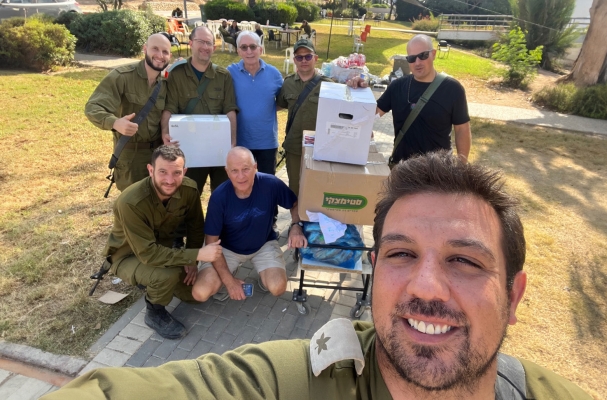
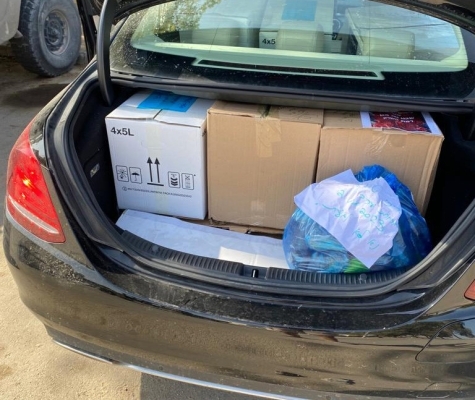
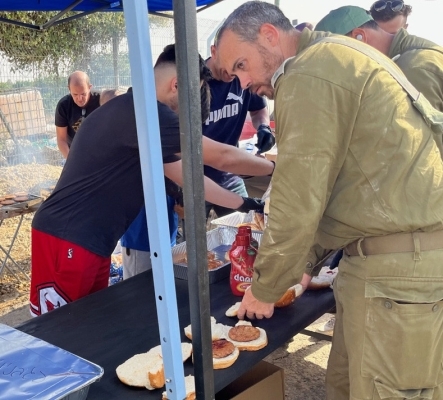
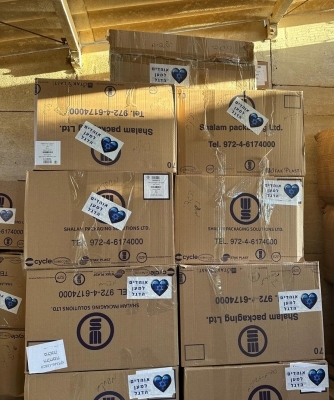
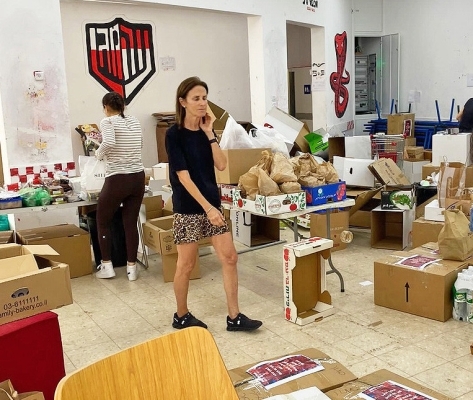




Comments